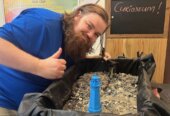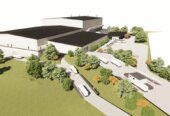
Alan Livingston has announced he’ll step down from the regional council in October, but will stay involved with projects in Cambridge, Te Awamutu and Pirongia.
A veteran of public service recently announced he’ll hang up his hat in October after more than two decades in local government.
Alan Livingston said it had been hard work and challenging, but also “an absolute privilege” to serve both the Waipa District and Waikato regional communities as a councillor, mayor and chairman. He will not be seeking a third term when local government elections take place in October.
“For the last 15 years as mayor and then regional council chair there has been a total commitment to the job, including evenings and weekends,” he said. “I’m very grateful to have had the opportunity, but the time is right for me to step back and spend more time with my family and grandchildren and enjoy some projects that have been put on the back burner.”
Livingston said he will continue to watch what happens locally with interest, and plans to remain involved in key projects around the district – including a museum for Cambridge which will depict the town’s sporting strengths across equine, rowing and cycling.
A Te Pahu native – on the slopes of Pirongia – Alan looks forward to continuing work on a book he’s writing about the history of his home area. Despite not specifically being a Cambridge or Te Awamutu, he says a highlight of his career was helping to unite both the towns after the disestablishment of the Te Awamutu and Cambridge borough councils.
“I guess that was one of the things I feel proud of, working hard to break down that Cambridge – Te Awamutu barrier in my time, and I think it was achieved.”
He was proud to have seen the district grow so successfully over the past quarter century, from becoming the Waipa Home of Champions, to Cambridge’s substantial growth.
He said back when he was a councillor in 1995, the council was concerned about the fact that Cambridge wasn’t growing.
“Te Awamutu was bigger than Cambridge,” he said “It was languishing, its infrastructure wasn’t the best, so it’s come a long way in a short time. Council did a rezone of Cambridge north, and that probably coincided with growth generally, but it just took off from there.
“The whole growth and vibrancy has just continued and I guess now the challenge is going to be to retain that special character of Cambridge, as it was. Encouraging growth but also ensuring that Cambridge character is retained.”
Alan said he hoped he’d made a positive difference to the district, reflecting on major upgrades to the Cambridge CBD in the early 2000s, the world-class upgrade of Karapiro domain a few years later, and the establishment of the Avantidrome as some of his top contributions to Cambridge.
“All of those things have just given Cambridge a real identity and a purpose we can all be proud of,” he said.
“The best advice I ever had was from Sir Patrick Hogan, which was don’t compromise quality,” he said as he remembered the CBD overhaul. “We had to ensure everything was done to a high standard, down to the quality of bricks for the street walk ways.”
“That wasn’t just about the pavement, we established the Sports Walk of Fame, the Equine Walk of Fame, the Melbourne Cup Wall of Honour, and of course the mare and foal statue.
“I think we still need to have something that acknowledges other Cambridge folk who have achieved.”
Livingston had some words of wisdom for aspiring councillors eyeing up the coming elections.
“Local government is big business, turning over millions of dollars and directly impacting people’s lives. You need very good financial acumen because you are making core decisions about other people’s money,” he said.
“Candidates need to be well aware of what their role is, and what their role isn’t. They will have to thoroughly research and consider some important decisions. You need to appreciate the differing views others bring to the table and you must have the capacity to think strategically and long-term.”
He said good councils worked as a team and that single issue people were of “little value” around a council table.
“You can make all the promises you like to get elected, but if your colleagues don’t agree with you, you won’t have support so you’ll get nowhere and deliver nothing.”









